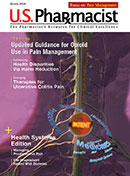US Pharm. 2013;38(7):33-34.
An Environmental Illness or Syndrome
Multiple chemical sensitivity (MCS) is a reaction to a host of synthetic chemicals in the modern environment. Patients with this syndrome experience a wide variety of symptoms when they are exposed to low amounts of environmental chemicals normally considered safe for humans. The most common complaints include headache, dizziness, fatigue, problems concentrating, earache, sore throat, congestion, difficulty breathing, chest and back pain, joint stiffness, racing heart, and other symptoms of anxiety and/or depression. A significant number of patients with symptoms of MCS have had a prior diagnosis of depression or other psychiatric condition.
There is considerable controversy about whether or not MCS exists, how to diagnose it, and how it should be treated. There is no known cause or proven biologic disease associated with MCS, and people with this syndrome do not show abnormalities upon laboratory testing, allergy testing, or physical examination. As a result, MCS is very difficult to treat. Management should be aimed at relieving symptoms and restoring a healthy lifestyle. Although one of the most commonly recommended treatments is avoidance of the substances believed to cause symptoms, many doctors do not support this because avoidance is not scientifically proven to relieve symptoms and results in isolation of the patient.
Symptoms of This Condition Are Often Vague and Nonspecific
There is no standard definition of multiple chemical sensitivity (MCS), so it is not known how many people it affects. When the syndrome was first described, it was thought to be a reaction similar to an allergic or immunologic disorder, but with the sensitivity to man-made chemicals found in our modern environment. Unfortunately, this theory has not been proven because people with these symptoms do not test positively for allergic or immunologic disorders. As a result, MCS is a controversial diagnosis at best, since the variety of vague symptoms cannot be scientifically linked to a physical illness with a known cause. Other labels for the term MCS include environmental illness, total allergy syndrome, 20th century disease, chronic candidiasis, and immune dysregulation.
A Controversial Diagnosis
There is little agreement among physicians about the existence of this syndrome, the reason it occurs, how it should be defined or diagnosed, and the best treatment. There are some generalities that can be made, however. The disorder most often affects women between ages 30 and 50 years and is diagnosed after self-report by the patient. The most common chemical irritants blamed for causing sensitivity reactions are formaldehyde, cleaning products, perfumes, paint fumes, gas fumes, and smoke; however, people may also blame common environmental substances such as ink, sugar, aspirin, and tap water for their symptoms.
A medical specialty known as clinical ecology has developed, in which doctors (primarily allergists) diagnose and treat this syndrome. The general medical community, however, does not recognize this specialty. Controversy exists because MCS has no known cause, it is blamed for many symptoms found with other conditions, the treatments recommended by clinical ecologists are not very effective, and a large number of patients with MCS have previously been diagnosed with other psychiatric conditions, such as anxiety, panic disorder, and depression, prior to developing the symptoms of MCS.
Alternative Treatment Options
People with MCS seek help from traditional and alternative health care practitioners, and may undergo expensive testing and unnecessary evaluations as well as unproven treatments that often do not provide them with relief. Patients can become discouraged, and in an effort to treat themselves may become isolated to avoid what they believe to be toxic substances in the outside world. Isolation from friends, family, and work can lead to serious depression and an unhealthy lifestyle. Although it is often recommended, isolation rarely relieves the symptoms of MCS, so it is very important that patients find the support they need from an understanding health care professional.
In controlled studies, patients with MCS have similar reaction rates when exposed to placebos or to the chemicals they believe are the cause of their illness. In theory, therefore, it would be of little benefit to avoid environmental chemicals. In addition, attempting to avoid low levels of these chemicals results in a patient’s isolation and self-absorption with illness, and these results are counterproductive to wellness. Treatment should include cognitive and behavioral therapy (CBT), with training in relaxation techniques. Physical exercise as well as structuring social interactions can help restore wellness, and medications to treat anxiety or depression may also be helpful. Therapies such as rotating diets, megavitamin supplements, antifungal medications, and “neutralization” injections have not been proven effective in clinical trials and should be avoided.
To comment on this article, contact rdavidson@uspharmacist.com.






